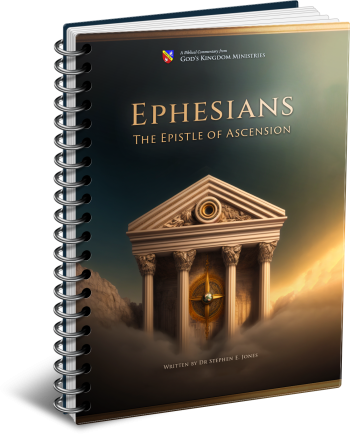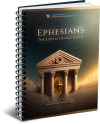Latest Posts
View the latest posts in an easy-to-read list format, with filtering options.

Paul's epistle to the Ephesians is, in some ways, a continuation of his epistle to the Romans. It enlarges upon Romans 1-8 in regard to the believer's position and right standing with God. We are "seated" with Christ, so we must "walk" according to our calling, and "stand" in the full armor of God against those who would oppose us.
Category - Bible Commentaries

Paul writes in Eph. 5:1, 2,
1 Therefore be imitators [mimetes] of God, as beloved children, 2 and walk in love, just as Christ also loved you and gave Himself up for us, an offering and a sacrifice to God as a fragrant aroma.
The Greek word mimetes means to imitate or follow someone as an example or pattern. Disciples were expected to follow the example of their master so that they would be more and more like him as time passed. In this case, Paul exhorts the church to imitate God “and walk in love.” He pictures a family, where God is a Father and we are His children.
Elsewhere, Paul told his Corinthian disciples to imitate him as well. 1 Cor. 4:15, 16 says,
15 For if you were to have countless tutors in Christ, yet you would not have many fathers, for in Christ Jesus I became your father through the gospel. 16 Therefore I exhort you, be imitators of me.
More literally, Paul says, “I have begotten you through the gospel.” Hence, the Corinthians were Paul’s spiritual children. By depositing in their ears the word of truth, Paul could also say that he was their father, although, of course, their real Father was God Himself.
Paul repeats this idea later in 1 Cor. 11:1,
1 Be imitators of me, just as I also am of Christ.
If Paul had not been an imitator of Christ, he would have had no word of truth (gospel) by which to beget spiritual children. Others have used Paul’s statements to demand that others follow them, using this to establish the denominational spirit. But insofar as those denominations refuse to imitate Christ (or even Paul), this exhortation does not apply to them. We should imitate men only as they imitate Christ.
Paul’s use of this term in Eph. 5:1, 2 tells us to imitate God “and walk in love,” for we know that God is love. When we become love, then we will fulfill this command. Such love is self-sacrificing, Paul says, comparing it to an Old Testament burnt offering in Lev. 1:9, 13, and 17, “a soothing aroma to the Lord.” A burnt offering depicts a life which has allowed the Holy Spirit to baptize with fire and to burn up all “flesh.” In other words, the flesh no longer rules or dictates one’s thoughts or actions, as, for example, we see with Christ.
This “soothing aroma” is a fragrance that soothes God. The Hebrew word is nehoah, a word derived from Noah. It means “restful,” implying sweetness, quieting, tranquilizing. It implies that someone has entered into rest, ceasing from his labors, being satisfied that all is finished, and that he is able to fully enjoy the fruit of his labor. Hence, this “aroma” is “a sweet savor” (KJV).
This burnt offering prophesies of the day when God’s work is completed, when all flesh has been burnt up in the great baptism of fire (Matt. 3:11, 12). God will then be fully satisfied, having restored all things to the original order of creation in putting all things in subjection to Christ. It also implies that God will not rest until He has accomplished His plan for creation. The love of God compels Him, His power gives Him the ability, and His wisdom devises a way to accomplish His goal.
Eph. 5:3, 4 says,
3 But immorality or any impurity or greed must not even be named among you, as is proper among saints; 4 and there must be no filthiness and silly talk, or coarse jesting [dirty jokes], which are not fitting, but rather giving of thanks.
These are some of the things in life that are to be burned to a crisp by the fire of the Holy Spirit as we offer ourselves as living sacrifices to God (Rom. 12:1). In fact, it is not just about changing one’s behavior but of eliminating the flesh altogether, so that these things cease automatically. Such things, we know, do not proceed from the spiritual mind of the new man.
Eph. 5:5 continues,
5 For this you know with certainty, that no immoral or impure person or covetous man, who is an idolator, has an inheritance in the kingdom of Christ and God.
Paul focuses upon three characteristics in verse 3, repeating them in verse 5. In verse 3 these are immorality, impurity, and greed. In verse 5 Paul speaks of people who are immoral, impure, and covetous. In other words, “greed” (pleonexia, “the continual desire for more, insatiable”) in verse 3 is replaced by “covetous” (pleonektes, “one who is greedy or covetous”) in verse 5.
The Tenth Commandment, which seems to summarize all of the commandments, says, “You shall not covet” (Exodus 20:17). Col. 3:5, KJV says, “covetousness, which is idolatry.” Those who are greedy or covetous are idolators, Paul says, for they idolize the things that belong to others. Jealousy is a good measure of covetousness.
When others have more than we do, how do we react? Do we rejoice in their prosperity, or do we think they owe us part of their wealth? Governments pander to the fleshly greed of the people by promising to give them other people’s money. This is called Socialism, based on the idea that poor people are entitled to the fruits of another man’s labor. Socialism is theft by biblical standards. Modern Babylon is based on theft that has been legalized by governmental decree (Rev. 9:21).
God’s way encourages men to love their neighbors, to “labor... so that he will have something to share with one who has need” (Eph. 4:28). It allows people the joy of giving freely. Socialism, which is the government of greed, removes that joy by forcing laborers to give up their wealth involuntarily through taxes. When governments tax the people over and beyond the biblical tax (tithe), they deprive laborers of the joy of giving freely.
The problem is that Socialism, based on the law of sin and death, is never satisfied. So Hab. 2:5 says, “he enlarges his appetite like Sheol, and he is like death, never satisfied.” So the Socialists present their ideals as “Democracy,” by which they mean equality of wealth, without respecting the property rights of those who labored. Of course, the leaders of Socialism exempt themselves from this redistribution of wealth, and they invariably become wealthy.
The problem is, as someone put it, that in the redistribution of wealth, eventually you run out of other people’s money.
By contrast, the Kingdom of God is based on the principles of “You shall not covet” and “You shall not steal.”
Eph. 5:6 says,
6 Let no one deceive you with empty words, for because of these things the wrath of God comes upon the sons of disobedience.
By its own example, Babylon teaches men to steal, implanting seeds of greed, which is idolatry. Babylon’s gospel, Paul says, consists of “empty words,” or vanity. Babylon does not speak the truth, because it rejects The Truth—Jesus Christ. We who imitate God understand His laws that define the love of God.
The walls of the New Jerusalem are the laws of the Kingdom, which are designed to keep out thieves (John 10:8-10). Walls are designed to channel people to the gates (or doors), so that they may enter in a lawful manner as friends, not enemies.
Eph. 5:7-10 says,
7 Therefore do not be partakers with them; 8 for you were formerly darkness, but now you are Light in the Lord; walk as children of Light 9 (for the fruit of the Light consists in all goodness and righteousness and truth), 10 trying to learn what is pleasing to the Lord.
To be Light is to walk in the continual light of truth and the word of God. The “children of Light” live by “goodness and righteousness and truth,” and they always strive “to learn what is pleasing to the Lord.”
Eph. 5:11-13 says,
11 Do not participate in the unfruitful deeds of darkness, but instead even expose them; 12 for it is disgraceful even to speak of the things which are done by them in secret. 13 But all things become visible when they are exposed to the light, for everything that becomes visible is light.
The “children of light” expose darkness wherever they go, because their light contrasts greatly with the darkness in the world. Their very presence and their practices make the darkness flee, making all things visible so that people can see truth (or reality). The lies of Babylon and the deception inherent in its manner of government must be exposed by the gospel of Christ. Babylon is a political extension of the darkness that lies within the natural man, and it is exposed when the light of the Sixth and Tenth Commandments shines upon its evil ways.
We who are imitators of God are building a Kingdom that is rooted and grounded in Love, which is the very nature of God. So let us “not participate in the unfruitful deeds of darkness” by trying to build Babylon’s kingdom. Let us build the walls of the New Jerusalem by establishing the laws of God. Paul says in Rom. 13:10,
10 Love does no wrong to a neighbor; therefore love is the fulfillment of the law.